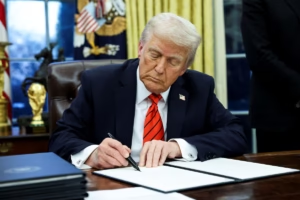In what came as a surprise to many, the Hindu nationalist Bharatiya Janata Party, or BJP, won a majority of constituencies in the recent Delhi elections, which took place on February 5, 2025. The right-wing BJP, the party of Indian Prime Minister Narendra Modi, had been out of power in India’s capital for nearly three decades, with power being held by either the centrist Congress party or the center-left Aam Aadmi Party, or AAP, which had been running Delhi up until this election.
The AAP was founded in 2012 as a result of large anti-corruption protests that had taken place the year before against members of the then-in-charge Congress party. Catching much attention and votes, the party soon rose to become the second-largest party in the Delhi legislature following the 2013 elections. Despite not holding a majority of seats, the AAP collaborated with some members of the Congress party to form a coalition government, which lasted only 49 days due to party leader and then-Chief Minister of Delhi Arvind Kejriwal’s inability to pass a cornerstone anti-corruption bill. However, the party returned to power in 2015 after winning an astonishing 67 out of 70 seats. In 2020, the party’s governing mandate was emphatically renewed, with another huge majority of 62 out of 70. As such, the BJP’s victory in this month’s elections represents a substantial shift in Delhi’s political landscape.
The BJP won 48 seats, a comfortable margin over the 36 required to form a government, with the AAP taking the remaining 22 seats. This makes the current Legislative Assembly one of the most divided in recent history and demonstrates the competitiveness of Delhi’s political landscape. The BJP’s victory means one of the party’s chief political goals has been accomplished. The party spent a great deal of resources on the election, with important party officials including Modi attending numerous campaign events across the capital territory. Yet, the AAP’s weaknesses also contributed to their ouster from power. The party and its leaders had been embroiled in numerous corruption scandals, diminishing the party’s trustworthiness and angering many of its former voters, who had joined the party based on its fierce anti-corruption positions. In a sign of voter’s dissatisfaction with the party and its corruption scandals, former Chief Minister Kejriwal was voted out of his constituency.
Performance of the three major parties in Delhi elections, 1993-2025. (The Times of India, 2025)
The election campaign was fraught with misinformation, attacks, and ingenious marketing strategies. The AAP accused the BJP-led national government of launching false and politically motivated corruption investigations into its leaders, fining, imprisoning, and harming their reputation. Furthermore, the AAP, along with other opposition parties, has raised concerns that the Election Commission of India has acted in ways that have benefitted the BJP party in elections such as this one or elections in the state of Maharashtra that took place last year, where there were purportedly more registered voters than people of voting age in the state.
Both parties promised various types of financial support to different groups in the state, with the AAP highlighting its support for women, students, and the elderly. Yet, the BJP attempted to one-up said promises by offering twenty percent more support for women, various additional subsidies on goods such as gasoline, and improved insurance for taxi drivers, who had previously staunchly supported the AAP. Of particular note was a truck sent by the BJP around Delhi, displaying a large golden toilet, in an attempt to attack AAP Leader Kejriwal’s appearance as an ordinary person. Aside from advertisements and political campaigning, the BJP may have gotten a boost from the recently-passed national budget, which included large tax cuts for the middle class, an important voting bloc in Delhi.
Having fared poorly in last year’s national elections, losing their outright majority, Modi and the BJP will likely take lessons from their improved performance in the Delhi elections. Naturally, the election’s biggest loser was the Congress party, which failed to win even a single seat despite being the country’s second-largest party overall. Nonetheless, this election represents a testament to the popularity of an incumbent leader and party, bucking the recent trend of incumbents being voted out of office or taking major losses. As Delhi enters a new era of governance not yet seen this century, voters across the country are sure to be watching the BJP’s performance carefully.
Featured image: Supporters of the BJP celebrate their party’s victory. (Arun Sankar, 2025)







